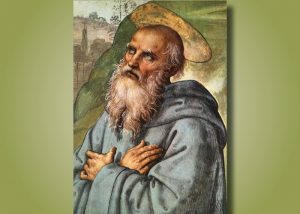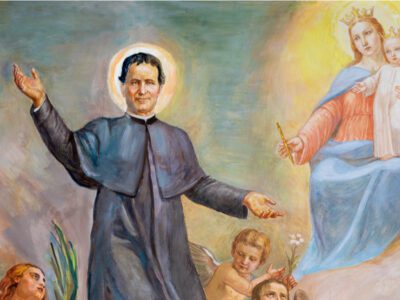 Saint Benedict, the father of Western monasticism, is considered a model of Christian stewardship. He authored the famous Rule of St. Benedict, a handbook of daily Christian living that emphasizes exercising stewardship over prayer, work, and community.
Saint Benedict, the father of Western monasticism, is considered a model of Christian stewardship. He authored the famous Rule of St. Benedict, a handbook of daily Christian living that emphasizes exercising stewardship over prayer, work, and community.
Born in central Italy in the town of Nursia around 480, Benedict studied in Rome as a young man. He was so distressed by the chaos and incivility he found there that he left the city and traveled to Subiaco, Italy to become a hermit. He soon attracted followers who wanted to join him in his simple way of living; imitating his style of prayer and work while respecting the rhythms of the day. Benedict stayed there for 25 years before taking a small group of his monks to Monte Cassino, near Naples, where he wrote the final version of his Rule.
The Rule of St. Benedict started a simple, spiritual tradition that exists to this day. It was meant to “…establish a school for the Lord’s service.” It is a set of Christian principles around which the members of the community were to organize their daily lives, focusing on the most important Christian values that would direct their daily actions and help them cultivate habits that would ensure good stewardship of their physical, emotional and spiritual well-being.
A hallmark of Christian stewardship is hospitality, making room for others. St. Benedict found this aspect of the Christian life especially important for his communities. In his Rule, St. Benedict writes:
“Let all guests who arrive be received like Christ, for he is going to say: ‘I was a stranger and you welcomed me (Mt. 25:35).’ ‘And to all let due honor be shown, especially to those who share our faith’ (Gal. 6:10) and to pilgrims…In welcoming the poor and pilgrims the greatest care and solicitude should be shown, because it is especially in them that Christ is received” (Rule of St. Benedict 53:1-2, 15).
The Rule of St. Benedict was meant to stand on the shoulders of the Gospels and many spiritual writers throughout the ages attest to its transforming power to change lives. It teaches the principles of stewardship, shows one how to live in a way that is uniquely countercultural and invites its adherents to enter into a deeper and more joyful relationship with the Lord.
St. Benedict died in approximately 550. He is the patron saint of monks and farm workers. In 1964 Pope Paul VI declared him to be the patron saint of Europe. His feast day is July 11.


